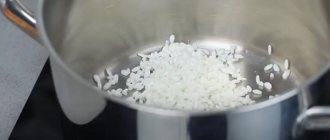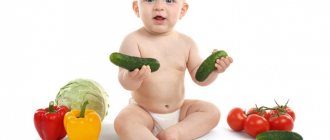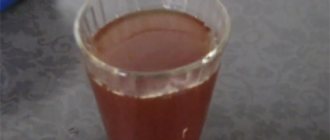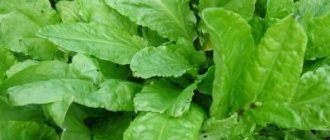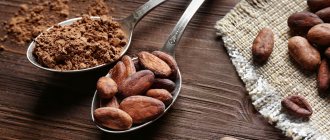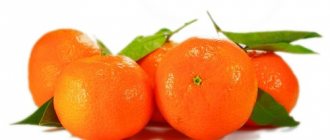Why does a child demand pickles?
According to nutritionists, children and adults often crave salty foods after suffering a severe infection, as well as in the case of an inflammatory process in the body. The desire to snack on a pickled cucumber is a signal of a decrease in the baby’s immunity.
The diet of a small child mainly consists of fresh food: vegetable purees and cream soup, milk and meat purees. This is another reason why he is drawn to salted and pickled vegetables. Mothers usually take responsibility for shaping their child’s menu. But grandmothers often believe that one crispy cucumber will do no harm. But, having tried pickles once, the baby may begin to demand them regularly. Especially on holidays, when there are a lot of adult treats on the common table.
Minuses
- Fresh cucumbers on the menu of nursing mothers can cause digestive problems in the baby.
- Cucumbers should not be consumed by children who have chronic diseases of the digestive system and kidneys.
- A baby may choke on a small piece of cucumber, as it is slippery and smooth. This especially applies to salted vegetables.
- Vegetables bought in a store or at the market may contain high levels of nitrates.
- Eating this vegetable in pickled form can cause diarrhea, swelling, severe thirst and a rash in the baby.
Harm and contraindications in childhood
Pickled cucumbers (especially if consumed in excess) can cause a bunch of side effects in your baby:
The content of salt, sugar, spices and vinegar in pickled and pickled cucumbers is the cause of contraindications:
Allergy to pickles
An allergy to pickled and pickled cucumbers can manifest itself in the form of skin rash, itching, irritation and redness of the eyes, increased tearing, runny nose and sinus congestion.
Canned cucumbers are dangerous not only because of the salt and vinegar they contain, but also because of the presence of spices, flavors and preservatives. They are a common cause of allergic reactions.
Can a baby choke?
The danger of lightly salted cucumbers for a small child also lies in the risk of suffocation. The baby may choke as the product has a hard peel and is difficult to chew.
Therefore, do not give a whole cucumber, as the baby may unintentionally bite off too large a piece. It is better to cut the vegetable into small pieces, offer no more than 1-2 mugs and keep an eye on the child while he eats.
High salt content
Apart from homemade pickles, almost all pickles are high in sodium. When purchasing pickles in the store, parents should read the label carefully and remember that the doctor-approved daily sodium allowance for young children does not exceed 1000 mg.
The benefits and harms of cucumbers
Fresh cucumbers are rich in vitamins C and K, potassium and iodine, zinc and copper. They kill harmful bacteria, including staphylococcus. What is important is that this vegetable rarely causes an allergic reaction. And when grated, cucumber has a mild laxative effect and helps with constipation.
The vitamins and minerals in cucumbers are balanced, so the product is easily digestible and has a positive effect on the health, growth and development, and immunity of children and adults. By the way, contrary to public opinion, salted and pickled cucumbers also have some positive effects.
After cucumbers are salted or pickled, they undergo a fermentation process, which results in the formation of lactic acid. It removes excess fat and harmful cholesterol plaques from the walls of blood vessels, and prevents the development of intestinal infections.
In addition, pickles increase appetite and quickly satisfy hunger, stimulate intestinal function and regulate metabolism. They strengthen muscles and nerve cells, relieve stress and tension, help cope with physical activity and improve mood. After fermentation, the content of B vitamins and vitamin C in such products increases.
However, this product, even fresh, can have harmful effects. First of all, it contains a large amount of coarse fiber, which irritates children's intestines, provokes abdominal pain, flatulence and stool disorders.
Today, vegetables are often grown using dangerous antibiotics, nitrates and chemicals. This leads to severe poisoning and thirst, disturbances in the development and growth of the child, allergic reactions and intestinal infections. Harmful substances are difficult to wash off from vegetables, so it is advisable to peel the product before use.
But salted, pickled and lightly salted cucumbers are especially dangerous. They lose some of their beneficial properties, can cause severe poisoning and an allergic reaction, and harm internal organs.
Recipe for baby pickles without vinegar
The best way to control the sodium, carbohydrates and chemicals in pickles is to make them at home, perhaps with your child.
Ingredients (for 3 l):
These home-salted cucumbers can be given to a child aged three years or older.
Watch the video recipe for baby cucumbers:
Source
What cucumbers can a child eat?
The cucumbers are first grated, then given in pieces. At the same time, do not forget to rinse the product well and peel the peel. Since they increase appetite, give the vegetable to children before the main meal. And to improve the absorption of vitamins, season the vegetable with vegetable oil or sour cream.
Cucumber goes well with boiled eggs, meat, fish, cheese and other vegetables. However, the combination of tomatoes and cucumbers increases the load on digestion, so such salads are best given to children over two to three years of age. Choose for your child dense fruits of ground varieties, with matte skin and rich color.
Do not accept food with stains, bruises or rotten areas. Do not take large, yellowed and overripe fruits, long spring varieties, as they often cause poisoning and stomach upsets. Give preference to young summer cucumbers with green skin and small seeds.
After heat treatment, cucumbers lose almost all their beneficial properties. Therefore, this vegetable is not used for preparing stews and other similar dishes, but is eaten only fresh. From fresh cucumber you can prepare a variety of salads and drinks for kids.
Salted cucumbers
Basically, after feeding this pickled cucumber, I kept expecting allergies and terrible sobs about stomach pain and constipation . But everything worked out. By the way, the child even slept peacefully that night.
It’s clear that under no circumstances should these little ones be allowed pickles, but since this happens, you need to make sure that the cucumbers are not pickled . I know one mother of three children, and her youngest child really demanded a pickled cucumber.
He banged on the jar of pickles and cried. She had to open it and give it to the child. It is believed that something is missing in the child’s body, but I think this is complete nonsense. The child just liked the taste of pickled cucumbers and now demands it.
When I was pregnant with Katya, I ate pickles even with tea - I couldn’t stop. Sasha had different taste preferences.
And I’m thinking, maybe this diet also influenced the child, and she will grow up to eat cucumbers on both cheeks? In the meantime, I think you need to abstain from such food.
Popular message topics
According to official data, the city was founded in 1887. Originally there was a prison here. For 70 years, the city hardly developed, although it was the center of the Trans-Baikal region. But as soon as they began to build the Trans-Siberian Railway,
The roe deer belongs to the order of artiodactyls from the deer family. It got its name because of its resemblance to a goat. Its name is translated from Latin as wild goat.
A teacher is one of the most honorable professions in the world. This is a person who, together with his parents, gives the child new knowledge, educates him, helps to cultivate his personality, instilling the necessary moral values.
Cucumber is a very popular vegetable crop. The annual cucumber is a herbaceous plant of the Cucurbitaceae family. The stem of this vegetable is built along the ground. It is rough and has antennae at the end, with which it can cling to any support. The stem can grow up to 2 meters.
The fruit of the cucumber is juicy, pimply, emerald green in color. Depending on the variety of cucumber, it can be of different shapes and sizes.
Cucumber fruits contain more than 95% water. In addition, this vegetable contains a huge amount of useful substances: minerals (potassium, magnesium, phosphorus and calcium); vitamins (C, PP, B). Proteins, fats and carbohydrates are also included in the vegetable. Organic substances contained in fruits help improve digestion and metabolism. Potassium is beneficial for people with heart disease. Fiber helps remove cholesterol from the body.
Cucumber is a fairly ancient vegetable crop. The cucumber first became known more than 6 thousand years ago in India. In these parts, cucumber is still a wild plant.
Cucumber is a fairly popular vegetable all over the world. It ranks fourth among other vegetable crops. Many varieties and hybrids of cucumbers have been developed that are characterized by high yields. Some can produce fruit without pollination, while others require insects to carry pollen.
Cucumbers are grown both in open ground and in greenhouses. This vegetable loves fertile soil and abundant watering. It is necessary to sow cucumbers only after the earth has warmed up well. This is possible only in mid-May. If you sow sprouted seeds, they will sprout faster. Caring for the plant is not at all difficult: in addition to watering, all that is required is weeding from weeds. To collect the seeds yourself, you need to leave the fruit in the garden until it is completely ripe. It should turn yellow and soft. The contents of the fruit are squeezed out and the seeds are washed. Then the seeds are dried and stored in a cool place until spring.
Cucumber fruits are used not only in cooking, but also in medicine and cosmetology. Cucumber fruits are eaten both raw and salted and pickled. They can be a separate dish or included in various salads, hot and cold dishes.
The medicinal properties of cucumber are actively used in folk medicine. But salted and pickled cucumbers are contraindicated for kidney, liver and cardiovascular diseases.
Sauerkraut
Sauerkraut is very rich in various microelements. It is especially high in vitamin C. Even pregnant women are recommended to include it in their diet.
But sauerkraut for adults is a heavy product, what can we say about the imperfect children’s digestive tract. This is a very heavy product for children.
During the fermentation process, fermentation products appear in it. Children may not only get stomach ache, but also develop allergies. In general, sauerkraut is not recommended for children under 5 years of age.
Pickled cucumbers for children
Benefit
- They whet the appetite
- Contains fiber and can help relieve constipation
Harm
- Contains salt, vinegar, is subject to heat treatment,
- About 70% of vitamins in pickled cucumbers are destroyed,
- Vinegar has a bad effect on the gastric mucosa and tooth enamel, has a stimulating effect on the nervous system, disrupts sleep,
- Salt is not good for children
Pickled cucumbers are generally not recommended for children.
Now you know when and what kind of cucumbers your child can eat . Stay healthy!
SIMILAR ARTICLES:
- When can a child have tomatoes? This beautiful and tasty vegetable...
- Pumpkin for a child When you can Pumpkin is easy to prepare,...
- Peas for a child When can you eat peas for a child?...
- When can a child? How much can a child have? When can a child? How much can a child have?...
- Potatoes for a child When can a child have potatoes? Potatoes are one of the cheapest available...
